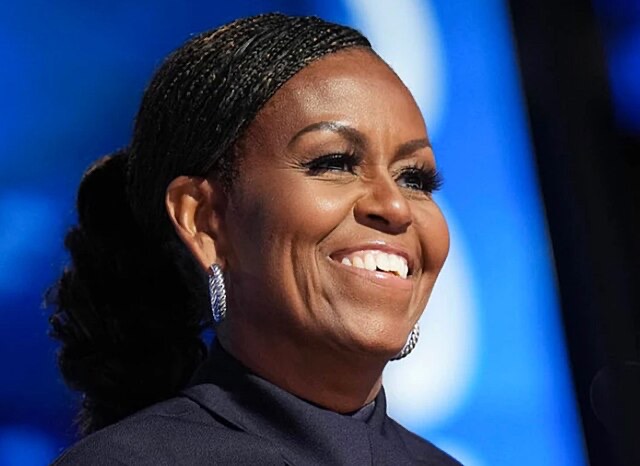A Former First Lady’s Honest Reflection on Aging and Change
Michelle Obama, one of the world’s most respected and influential women, is once again using her platform to lead important conversations—this time about mental health and personal growth. At 60, the former First Lady revealed in a recent podcast interview that she is currently undergoing therapy to help her adjust to major life transitions, including becoming an empty nester.
Public Revelation During Podcast Tour Promoting Her New Show
Speaking on The Jay Shetty Podcast, while promoting her upcoming podcast co-hosted with her brother Craig Robinson, Michelle spoke openly about the challenges she’s facing as she enters a new, quieter phase of her life—without the presidency, the White House, or the constant presence of her daughters.
Therapy and the “Empty Nester” Phase
“I’m in Therapy Right Now” — Obama’s Refreshing Vulnerability
“I’m in therapy right now because I’m transitioning, you know? I’m 60 years old,” Obama said. “I’ve finished a really hard thing in my life with my family intact.” The “hard thing” she refers to is no doubt her years in public service and raising two daughters under global scrutiny. Her candor about therapy is resonating with many women—and men—facing similar identity shifts.
Navigating Motherhood’s New Chapter After Malia and Sasha
With both Malia and Sasha Obama now grown and living independently, Michelle described herself as an “empty nester” navigating the emotional complexity of watching her children take flight. Therapy, she explained, is helping her redefine her own life purpose in this new era.
Life Beyond the White House
Shifting From Political Duty to Personal Purpose
After serving as First Lady for eight years, Michelle has gradually transitioned into a quieter, more introspective life. “Being out of public service has significantly shifted my decision-making process,” she explained. No longer bound by political optics or public expectations, Michelle is learning to make decisions rooted in her own intuition.
Letting Go of External Pressures and Discovering Inner Voice
Michelle also touched on the psychological toll of always putting others first—whether it was the country, her husband’s career, or her daughters’ wellbeing. Now, she’s giving herself permission to listen to her own needs, guided by a therapist who is “getting to know me now.”
The Power of Reinvention at 60
Michelle’s Message to Women Embracing Later-Life Transitions
By speaking openly about her journey, Michelle is challenging outdated perceptions of what it means to age, especially as a woman. Her message is one of empowerment: that turning 60 isn’t an end, but a beginning—a chance to rewrite personal narratives with honesty and courage.
Redefining Identity Beyond Career and Family Roles
Many women struggle to rediscover their identity after children leave home or they retire from work. Michelle’s willingness to discuss this publicly provides validation for those navigating similar emotional landscapes.
The Role of Family and Her New Podcast
Partnering with Her Brother Craig Robinson to Explore Deep Topics
Michelle’s new podcast, co-hosted with her brother Craig Robinson, is expected to delve into family, upbringing, mental health, and the Black American experience. The partnership reflects her belief in the healing power of honest conversations and sibling bonds.
Using Personal Conversations to Spark Broader Societal Change
The podcast, which will stream on Spotify and other major platforms, continues Michelle’s legacy of blending personal storytelling with social impact. Her goal? To make emotional vulnerability normal and necessary—especially for women of color and women in leadership roles.
Mental Health and Public Perception
Why Michelle’s Openness Is Being Widely Praised
Mental health advocates have applauded Michelle’s transparency. “For someone of her stature to admit they’re in therapy sends a powerful message,” said one mental health expert. Her story is helping to dismantle the stigma that therapy is only for crises or weakness.
Reducing the Stigma of Therapy for Older Women
Traditionally, therapy has been a taboo topic for older generations—particularly among women expected to “hold it all together.” Michelle’s honesty breaks that mold and sets a powerful precedent for others to seek help without shame.
Media and Audience Reactions
Social Media Applauds Her Vulnerability and Strength
Within hours of the podcast’s release, social media exploded with support. Hashtags like #MichelleObama, #TherapyIsStrength, and #EmptyNesterGoals trended as people praised her for modeling emotional authenticity in a world that too often demands stoicism.
A New Blueprint for Aging, Authenticity, and Emotional Wellness
Michelle Obama’s message is clear: vulnerability is strength, and evolving at any age is not only natural—it’s necessary. Her openness is creating a new blueprint for how women, especially those in midlife and beyond, can embrace personal transformation.
Conclusion
Michelle Obama Continues to Inspire by Embracing Her Own Evolution
Michelle Obama has always inspired through grace, intelligence, and strength. Now, she’s showing the world that personal growth doesn’t end at 60—it simply shifts. By embracing therapy, redefining herself post-White House, and opening up about emotional challenges, she continues to blaze a path for others to follow.
FAQs
Q1: Why is Michelle Obama in therapy?
A1: She’s undergoing therapy to navigate her life transition at age 60, particularly after becoming an “empty nester” and stepping back from public service.
Q2: What podcast did Michelle Obama appear on recently?
A2: She spoke on The Jay Shetty Podcast while promoting her own upcoming podcast co-hosted with her brother Craig Robinson.
Q3: What topics will her new podcast cover?
A3: The podcast will discuss family, mental health, personal growth, and cultural identity.
Q4: Why is her openness about therapy important?
A4: It helps normalize mental health care and encourages others—especially women over 50—to seek support during transitional life stages.
Q5: How has the public responded?
A5: Public response has been overwhelmingly positive, with many praising her vulnerability and calling her an inspiring example for aging gracefully.



